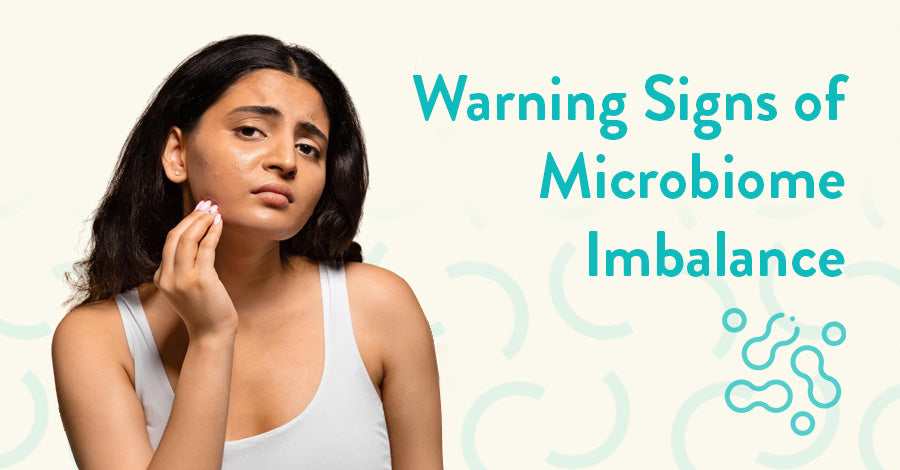Gut Dysbiosis: Signs Your Microbiome Is Out of Balance
If you’ve been experiencing bloating, digestive issues, skin problems, fatigue, or even mood swings, your gut could be trying to send you a message. More specifically, the invisible but mighty gut microbiome a community of microbes living in your digestive tract may be out of balance. The gut microbiome plays a vital role in digestive health, immunity, metabolism, and even mental well-being. When this microbial community is healthy and balanced, your body functions smoothly. But when there's an imbalance, harmful gut bacteria outnumber beneficial ones, leading to a condition known as gut dysbiosis.
In this article, we’ll explore the concept of gut dysbiosis, examine its underlying causes, and outline signs that may indicate an imbalance in the gut and microbiome requiring attention.
How Does This Balance Get Disturbed?
In a healthy state, this microbial ecosystem maintains a stable balance where beneficial microbes support digestion, nutrient absorption, immune function, and protection against harmful pathogens.
Gut dysbiosis refers to a state of imbalance in the microbiome in gut. It occurs when the composition, diversity, or function of gut bacteria microbiome is disrupted often marked by a reduction in beneficial bacteria and an overgrowth of potentially harmful or pro-inflammatory species.
Common Causes of Gut Dysbiosis
-
Antibiotic Use:
Antibiotics are medicines used to fight infections caused by harmful gut bacteria. But many antibiotics, especially broad-spectrum ones don't just kill the bad microbes; they also eliminate good gut bacteria that help keep your gut health intact. -
Poor Diet (Low in Fiber, High in Sugar and Fat):
What you eat directly affects the gut microbiome. A diet for healthy gut bacteria should be rich in fiber and plant-based foods. In contrast, diets high in sugar, fat, and processed ingredients support harmful bacteria and yeasts, contributing to gut issues. Many foods that are good for gut bacteria, like fermented vegetables, legumes, and whole grains, are often missing from modern diets. -
Chronic Stress and Poor Sleep:
The gut-brain axis facilitates constant communication between your digestive system and your brain. Chronic stress increases cortisol, reducing protective mucus in your gut and increasing permeability. This disrupts gut bacteria and contributes to digestive problems. Poor sleep can further throw off your microbial rhythm. -
Infections:
Stomach infections can destroy good gut bacteria and damage the gut lining. Post-infection, it can take time for the gut microbiome to restore itself. -
Environmental Toxins:
Pesticides, heavy metals, and pollutants interfere with microbial balance. These toxins may harm beneficial gut bacteria and increase gut issues through inflammation. -
Cesarean Birth and Lack of Breastfeeding:
Babies born via C-section miss the opportunity to absorb their mother’s gut bacteria during birth. Likewise, breast milk contains prebiotic sugars that nourish the infant gut microbiome. -
Aging:
Older adults often show a decrease in the diversity of their gut microbiome, which leads to more inflammatory species and chronic digestive issues. -
Chronic Illnesses:
Diseases like diabetes, obesity, and inflammatory bowel disease (IBD) are associated with microbial imbalances. Poor gut health may worsen these conditions and vice versa. -
Lack of Physical Activity:
A sedentary lifestyle reduces the diversity of gut bacteria. Regular movement helps promote digestive health .
How to Know If Your Microbiome Is Out of Balance
You don’t always need a lab test to notice gut issues. However, if you're unsure, a stool sample test, gut health test, or a gut microbiome test in India can give you detailed insights. The human body is incredibly intuitive, it often sends warning signals when the gut microbiome is disrupted. These signs may seem unrelated at first, but many are rooted in what’s happening inside your digestive system.
Here are some common symptoms of gut dysbiosis:
1. Digestive Distress
Bloating, gas, diarrhea, constipation, or indigestion can signal a disruption in your gut microbiome. Without enough good gut bacteria, food isn’t broken down efficiently, leading to discomfort and digestive issues.
2. Sudden Food Sensitivities
If you start reacting to foods like dairy or high-fiber vegetables, it could mean your gut bacteria diversity has decreased. This weakens your gut lining and allows food particles to enter the bloodstream, increasing inflammation and gut issues.
3. Weakened Immunity
About 70% of your immune cells are located in the gut. A healthy gut microbiome supports immune regulation. Frequent illness may suggest you're lacking good gut bacteria to defend against harmful microbes.
4. Skin Issues (Acne, Eczema, Rashes)
The gut-skin axis links internal health with skin appearance. Inflammation in the gut microbiome may manifest externally, causing acne or eczema.
5. Mood Swings, Anxiety, or Brain Fog
Your gut is sometimes called the “second brain” for a reason. Gut dysbiosis can disrupt the gut-brain axis—leading to mental and emotional symptoms that feel “out of nowhere.” An unbalanced gut microbiome interferes with neurotransmitter production, affecting mood and focus.
6. Unexplained Fatigue
If you're exhausted despite adequate sleep, your gut health may be impaired. Poor absorption of nutrients and chronic inflammation are common in gut dysbiosis which can lead to low energy levels.
7. Cravings and Weight Gain
An imbalanced gut microbiome can alter appetite hormones and cravings, especially for sugar and processed foods. These not only feed harmful microbes but also interfere with fat metabolism, resulting in weight gain and bloating.
Your gut health influences everything from digestion to immunity to mood. Recognizing signs of gut dysbiosis and eating gut healthy foods, such as yogurt, kimchi, or fiber-rich vegetables can improve your digestive health. A mindful diet and gut health routine not only reduces symptoms but can also prevent chronic digestive issues in the long run.
Your gut isn’t just a digestive organ, it’s your body’s command center for well-being. Feed it well with foods that are good for gut bacteria, and it will support you in ways you never imagined.





